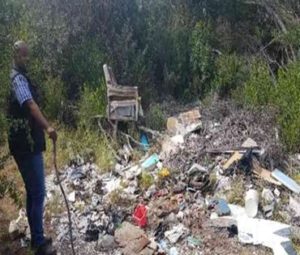29 October 2021 Media Release: Garden Route District Municipality improves its procurement practices to avoid Deviations
Media Release: Garden Route District Municipality improves its procurement practices to avoid Deviations
For Immediate Release
28 October 2021
Over the last few years, Garden Route District Municipality (GRDM) has improved significantly with the utilisation of deviations in its procurement processes.
According to GRDM Chief Financial Officer, Mr Jan-Willem de Jager, GRDM has invested significant time and effort in an attempt to reduce the amount of goods/services that had to be procured via deviations to the bare minimum. “Since 2017/2018 financial year, GRDM improved with a drop in deviations from ± R23 million to ±R2 million,” De Jager said.

Click on one of the buttons below to view the content relating to it
A deviation is a procurement process that falls within the ambit of Regulation 36 of the Municipal Supply Chain Management Regulations (Municipal Finance Management Act). Tebello Mpuru, Manager responsible for Stores, Data & Supply Chain Management at GRDM, explains: “It allows the Municipal Manager to dispense with the prescribed procurement processes established by the organisation’s Supply Management Policy of Council and to procure any required goods and services through any convenient process, provided that the reason for having to deviate falls within the allowed categories as per the legislation. This may include direct negotiations,” he said.
The SCM Regulations stipulates the following five (5) specific circumstances that legitimise the use of deviations:
- In an emergency situation
- If such goods or services are produced or available from a single provider only
- For the acquisition of special works of art or historical objects where specifications are difficult to compile
- Acquisitions of animals for zoos
- In any other exceptional case where it is impractical or impossible to follow the official procurement process; and
- To ratify any minor breaches of the procurement processes by an official or committee acting in terms of delegated powers or duties which are purely of technical nature.
The use of deviations for unjustifiable reasons leads to irregular expenditure. According to Mpuru, irregular expenditure due to the abuse of deviations, is frowned upon by stakeholders at all levels of the organisation, as the practice negatively affects the performance of the organisational. For that reason, this practice rarely ever escapes the public eye, as it creates a perception of intentional financial misconduct and the contravention of the relevant Municipal Finance Management Act (in a municipal context). On the question, why it is important not to follow the deviations route, Mpuru highlighted: “Through proper procurement planning by an organisation to put measures in place to have appropriate goods and service contracts for Council, a deviation would be an exceptional occurrence”. Each deviation would then allow the Council to update their procurement plan and put measures in place to avoid similar situations in the future, if possible. An event would rarely be entirely new; therefore, through proper planning, procurement contracts can be put in place ahead of time and ensure that minimal deviations can occur.
In further elaborating on the practice of deviating, De Jager explains that with emergencies that could still arise, considering that GRDM delivers disaster management and fire fighting services, would mean that some deviations would still be justifiably required. However “the organisation has shown great progress to identify every possible eventually for which we would be required to procure goods/services and has ensured that legislated procurement processes were followed to get adequate contracts in place for such goods/services”. In closing, he highlighted: “The success of this drive to reduce deviations is evident from how the total annual deviations has decreased over the last number of years”.
Procurement is about Council openly going into the market to procure goods and services and allow the market to be treated fairly in responding to the needs of the state. Government’s intention is to solicit goods and services in the market without prejudice and allow the market to respond with the best possible offer to Government. A procurement process is designed to be transparent, fair, equitable, competitive and cost-effective to ensure the state utilises public resources in a manner that translates into value for money.
Mpuru advises that when goods or services are procured, one should do a market analysis and ensure that you are fairly familiarised with the approximate market rate for those goods and services. One cannot claim ignorance by purchasing goods and services that are priced at an unreasonable cost – “Government has limited funding, as such every cent that is spent should be value for money. Failure to do so could be deemed as financial negligence and could be deemed as a crime against the state and the people of this country”. Every cent spent belongs to the public and should therefore be treated with utmost care to avoid irregular or wasteful expenditure – limited resources should translate in eliminating inefficiencies and obtaining the best possible value out of the market.
Procurement is merely a translation of the execution of planned objectives. Therefore every cent in the organisation should be spent according to the plans of Council. Planning, therefore, requires a lot more thought and attention to detail to ensure that those entrusted with public funds have a clear plan on what programs and projects of Council they plan to execute in the most efficient manner possible.
“Ultimately we are public servants, and we are accountable to the public as a primary stakeholder to serve our communities. Failure to ensure efficient use of public resources ultimately means that we have failed society to derive the highest value possible with Government’s limited resources. Every action we do to add, speaks to the sustainability of public governance and the stability and growth of society” Mpuru emphasised. “Therefore being prudent means if we plan accordingly it can only be of benefit to society at large of which we are also beneficiaries of,” he concluded.
ENDS



































